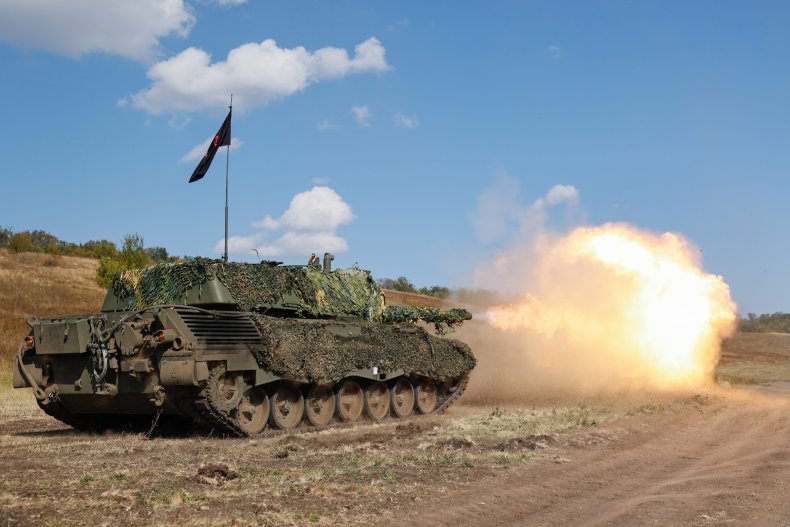Ukraine finds defects in more than half of tanks sent by ally

[ad_1]
A number of Danish tanks recently sent to Ukraine to bolster its military arsenal in the war with Russia are faulty.
A total of 12 of Denmark’s 20 Leopard 1A5 tanks it sent to Ukraine have issues, Denmark Defense Minister Troels Lund Poulsen said in a statement. Ten tanks successfully arrived in Ukraine and are being repaired by the Ukrainian military, while another 10 tanks remain in Poland—including two that have “serious defects.”
The announcement follows a tumultuous week for Ukraine and President Volodymyr Zelensky, who again traveled to the United States to convince lawmakers on Capitol Hill to approve additional aid. His requests were partially mired by bad news received from a key NATO ally, Poland, which abruptly announced it would no longer send weapons to Ukraine.
“This is more to do with the nature of how quickly Ukraine wants weapons,” Jordan Cohen, a policy analyst with the Cato Institute, told Newsweek. “If weapons are being sent swiftly, they are either coming from excess defense stocks (they are already made) or they are being produced within 18 months when the usual process can take twice that long.
“The problem is not necessarily just the defects, but that Ukrainians are being trained rapidly and not able to learn all aspects of maintenance,” Cohen said.

Roman Chop/Global Images Ukraine via Getty Images
Mikhail Troitskiy, a professor of practice at the University of Wisconsin-Madison, told Newsweek that recent military developments are not “insurmountable” for Ukraine and could simply be a byproduct of different governmental systems not properly repairing equipment.
“However, it may also be that the NATO governments are making conscious decisions to keep the best equipment for themselves because they want to be well-prepared for the proliferation of war beyond Ukraine,” he said. “European governments only choose to provide what remains after their revised needs in military equipment are met.
“If that is the case, the key question is whether such choices reflect reduced confidence in Ukraine’s ability to set Russia back and the depletion of resources available in NATO for transfer to Ukraine—or it is just a consequence of implementing long-term NATO plans to shore up allied defenses.”
German Defense Minister Boris Pistorius announced in July that his nation, in cohesion with Denmark and The Netherlands, would send 100 Leopard 1A5 tanks, with Germany responsible for the tanks’ renovations.
To add to Ukraine’s anxieties, the country also had issues with those German tanks earlier this week.
German news outlet Spiegel reported Tuesday that Ukraine refused to accept 10 Leopard 1A5 tanks attempted to be sent by Germany due to defects.
Ukrainian officials told the German Defense Ministry that it was pointless to deliver the tanks with defects due to not having the trained technicians or spare parts available to remedy the issues.
In response, German officials reportedly sent industry experts to Rzeszow, Poland, to examine the tanks, which they later reported were “heavily worn out” while training Ukrainian soldiers in Germany on their capabilities months ago.
A similar batch of defective tanks, among the first of the Leopard type to be sent to Ukraine, were received by the war-torn country in July.
Newsweek reached out to the Danish and German Defense Ministries via email for comment.
Cohen said that Poland’s announcement may be much ado about nothing significant considering that the country is still allowing weapons transit to Ukraine through its borders.
“Poland also has made a lot of its own commitments, but that pales in comparison to the entirety of Europe and the United States,” he added.
Troitskiy said such developments are indicative of a reality that Ukraine cannot succeed on its own and requires continued support “given the disastrous implications of a protracted war for NATO’s security and the international order.”
[ad_2]